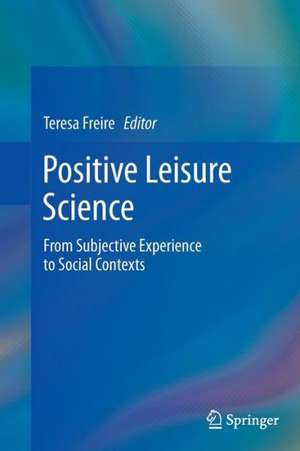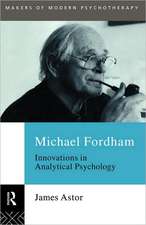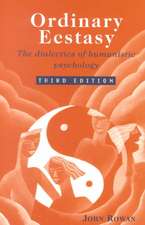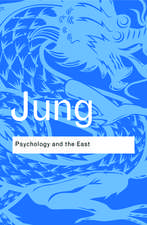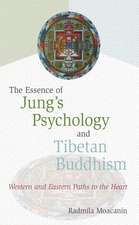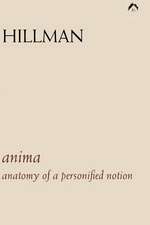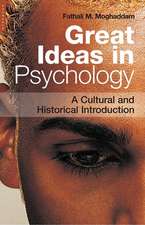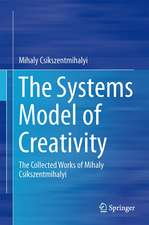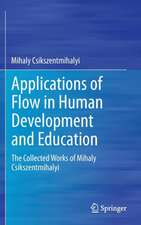Positive Leisure Science: From Subjective Experience to Social Contexts
Editat de Teresa Freireen Limba Engleză Paperback – 29 ian 2015
.
| Toate formatele și edițiile | Preț | Express |
|---|---|---|
| Paperback (1) | 638.11 lei 6-8 săpt. | |
| SPRINGER NETHERLANDS – 29 ian 2015 | 638.11 lei 6-8 săpt. | |
| Hardback (1) | 644.30 lei 6-8 săpt. | |
| SPRINGER NETHERLANDS – 16 dec 2012 | 644.30 lei 6-8 săpt. |
Preț: 638.11 lei
Preț vechi: 750.72 lei
-15% Nou
Puncte Express: 957
Preț estimativ în valută:
122.10€ • 127.18$ • 101.79£
122.10€ • 127.18$ • 101.79£
Carte tipărită la comandă
Livrare economică 28 martie-11 aprilie
Preluare comenzi: 021 569.72.76
Specificații
ISBN-13: 9789401780971
ISBN-10: 9401780978
Pagini: 248
Ilustrații: XVI, 232 p.
Dimensiuni: 155 x 235 x 13 mm
Greutate: 0.35 kg
Ediția:2013
Editura: SPRINGER NETHERLANDS
Colecția Springer
Locul publicării:Dordrecht, Netherlands
ISBN-10: 9401780978
Pagini: 248
Ilustrații: XVI, 232 p.
Dimensiuni: 155 x 235 x 13 mm
Greutate: 0.35 kg
Ediția:2013
Editura: SPRINGER NETHERLANDS
Colecția Springer
Locul publicării:Dordrecht, Netherlands
Public țintă
ResearchCuprins
Preface; Mihaly Csikszentmihalyi.- Introduction; Teresa Freire.- PART I. LEISURE AND POSITIVE LIVING.- Chapter 1. Research and Theory on Positiveness in the Social Sciences - The central role of leisure; Robert A. Stebbins.- Chapter 2. Redeeming leisure in later life; Douglas A. Kleiber.- PART II. LEISURE, GROWTH AND DEVELOPMENT.- Chapter 3. Adolescent Leisure from a Prevention Perspective; Linda L. Caldwell.- Chapter 4. Leisure experience and positive identity development;
Teresa Freire.- Chapter 5. Positive leisure science: leisure in family contexts; Ramon Zabriskie and Tess Kay.- Chapter 6. Leisure, optimal experience and psychological selection: Cultural and developmental perspectives; Marta Bassi and Antonella Delle Fave.- PART III. LEISURE, WELL-BEING AND QUALITY OF LIFE.- Chapter 7. Facilitating change through leisure: the leisure and well-being model of the therapeutic recreation practice; Colleen D. Hood and Cynthia P. Carruthers.- Chapter 8. Flow and leisure; Kim Perkins and Jean Nakamura.- Chapter 9. Physical activity, leisure time and health; Jorge Mota, Mauro Barros, José Carlos Ribeiro and Maria Paula Santos.- Chapter 10. Bringing Leisure in: the benefits and importance of leisure to non-resident fatherhood and parent-child contact; John M. Jenkins.- Chapter 11. Happiness through leisure;
Jeroen Nawijin & Ruut Venhoven. PART IV. LEISURE AND THE PURSUIT OF A POSITIVE LEISURE SCIENCE (PLS).- Chapter 12. Afterthoughts and future research directions on leisure; Teresa Freire and Linda Caldwell.-
Teresa Freire.- Chapter 5. Positive leisure science: leisure in family contexts; Ramon Zabriskie and Tess Kay.- Chapter 6. Leisure, optimal experience and psychological selection: Cultural and developmental perspectives; Marta Bassi and Antonella Delle Fave.- PART III. LEISURE, WELL-BEING AND QUALITY OF LIFE.- Chapter 7. Facilitating change through leisure: the leisure and well-being model of the therapeutic recreation practice; Colleen D. Hood and Cynthia P. Carruthers.- Chapter 8. Flow and leisure; Kim Perkins and Jean Nakamura.- Chapter 9. Physical activity, leisure time and health; Jorge Mota, Mauro Barros, José Carlos Ribeiro and Maria Paula Santos.- Chapter 10. Bringing Leisure in: the benefits and importance of leisure to non-resident fatherhood and parent-child contact; John M. Jenkins.- Chapter 11. Happiness through leisure;
Jeroen Nawijin & Ruut Venhoven. PART IV. LEISURE AND THE PURSUIT OF A POSITIVE LEISURE SCIENCE (PLS).- Chapter 12. Afterthoughts and future research directions on leisure; Teresa Freire and Linda Caldwell.-
Notă biografică
Teresa Freire (PhD) is assistant professor at the School of Psychology in the University of Minho, Braga, Portugal, and Director of the Psychological Counselling Service (ServPsi) of the School of Psychology.
She teaches in graduation, master and doctoral Psychology courses and supervises several master and PhD research projects, leading the research group for the study of optimal functioning (Grupo de Investigação para o Funcionamento Óptimo – GIFOp) aimed at studying the quality of subjective experience in daily life through the lens of positive psychology, in clinical and social psychological domains.
Based on her research findings, she has developed and supervised individual and group intervention programs, with children and adolescents. Leisure experience, and its implications to positive development of adolescents, has been one of her major research topics.
Teresa Freire also collaborates in international research teams and is author of national and international publications (peer-reviewed journals and books). She belongs to the European Network for Positive Psychology (ENPP), being member of the Management Board Committee and country representative for Portugal. She is the president of the Portuguese Society of Positive Psychology (Sociedade Portuguesa de Psicologia Positiva – SPPP).
She teaches in graduation, master and doctoral Psychology courses and supervises several master and PhD research projects, leading the research group for the study of optimal functioning (Grupo de Investigação para o Funcionamento Óptimo – GIFOp) aimed at studying the quality of subjective experience in daily life through the lens of positive psychology, in clinical and social psychological domains.
Based on her research findings, she has developed and supervised individual and group intervention programs, with children and adolescents. Leisure experience, and its implications to positive development of adolescents, has been one of her major research topics.
Teresa Freire also collaborates in international research teams and is author of national and international publications (peer-reviewed journals and books). She belongs to the European Network for Positive Psychology (ENPP), being member of the Management Board Committee and country representative for Portugal. She is the president of the Portuguese Society of Positive Psychology (Sociedade Portuguesa de Psicologia Positiva – SPPP).
Textul de pe ultima copertă
This book extends positive psychology by embedding leisure into the positive science field, following a new paradigm and aggregating various domains and fields. Positive science can be applied to the field of leisure and, in turn, leisure can serve as an arena to study some of the most important optimal functioning variables. The book presents knowledge on a diverse range of topics about optimizing socio-cognitive processes and behaviors, places and contexts, societies and cultures through leisure. These topics are unified by an underlying continuum that extends from individuals and subjective experiences to social worlds. The contributions highlight components of everyday life, showing that subjective experience and life trajectories are structured and social goals and life purposes are defined and achieved within interactions between individuals and their lived contexts and environments in daily life.
Caracteristici
Promotes new reflections and a new focus of analysis Shows the positive impact of leisure as a main source of optimized human development and well-being Integrates the study of different populations and life contexts across the life course Brings together researchers from various scientific fields across different countries
